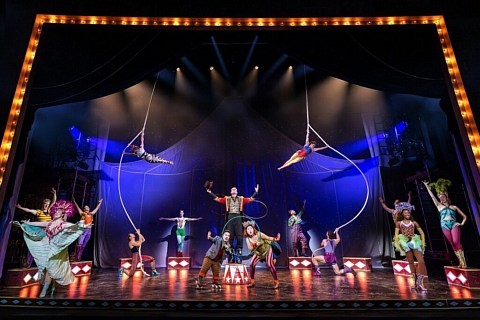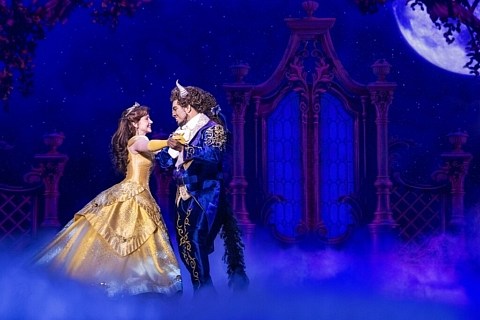In a production that saw the title character change sex, the UH School of Theatre and Dance put on an impressive production of Shakespeare’s “Julius Caesar.”
“Thou shalt see me at Philipi.” These are the fateful words spoken by the ghost of Caesar to Brutus before he and his fellow conspirators meet their doom. Shakespeare is a tall task for any actors, let alone college graduate students. But director Sara Becker and her cast of actors took their own unique take on Shakespeare’s tale of the fall of the Roman Republic.
The University of Houston School of Theatre and Dance took a new twist on the classic tale “Julius Caesar.” In the production, the company has the title character, and several other minor male roles, portrayed by female actors. It is a powerful display that shows performing Shakespeare does not depend on one’s sex.
Maddie Calais, who plays Caesar, takes control of whatever scene she is in. While being towered over by her fellow actors, she speaks with a commanding voice and stands with a posture that makes you believe she is Caesar. You get the feeling that before her demise she was the most powerful person in the room.
The roles of Brutus and Cassius were also perfectly cast. Jake Offen and Carlton Warnberg both give emotionally provoking performances as the two friends who take the greatest risk of all in order to save their country.
Offen portrays Brutus as the most level-headed of all the Romans. He never does anything out of haste. Offen portrays him as a man fearful of Caesar becoming king, but also wanting to avoid bloodshed. Brutus only takes part in the assassination once he is certain that it will lead to Rome’s salvation. Warnberg is the complete opposite. He presents Cassius as a person driven by fits of emotion. His speeches build as he seduces one conspirator after another to his plan. He is very much a man of action.
As a side note, I found myself enjoying the scenes with Brutus and Lucius, played by Catherine Thomas. His playing of the lute for Brutus gives a moment of calm before the tragedy that befalls Brutus and his companions. And then when Lucius fails to convince Brutus to flee, it is all the more tragic seeing him weep for his former master.
The one actor I initially had an issue with was Alan Brinks, who plays Mark Antony. Antony has always been portrayed as the strong right hand of Caesar. But in the first half, Brinks portrays him more as an overly loyal servant rather than a leading commander in Rome’s army. Prone to moments of tearful outbursts, Antony is presented as a weak character who at first does not want to live without Caesar.
But I was led astray. For in the second half Brinks used these impassioned outbursts as a tool in the “Friends, Romans, Countrymen” speech. The character of Antony changes drastically in that scene. He goes from a man crying on the stoop, to using those tears as a way to sway the crowd back to loving Caesar. At the start of the speech he has to fight to get a word out, and at the end he is the focal point. Now part of this is due to the writing, but a large part is due to Brinks. The man has a set of lungs. But it is amazing to watch that scene. Seeing all the work that Brutus and Cassius went into proving their point to the crowd, dashed away in one scene.
The production of the play was really great. By using the round Quintero Theatre the audience feels as if they are the rabble being addressed in the speeches. The actors are forced to be in a state of frequent movement. Everyone in the audience has to see their face at least once.
The costume design worked surprisingly well. Drawing comparisons to Julie Taymor’s film “Titus,” Rebecca Rose Callan dressed the cast in a mixture of modern and classical military garb. At times the characters would be wearing military boots and trousers but have a poncho-like top acting as a toga.
My one wish about the production was that more women had been cast in the lead roles. I went into the show having heard this was an all-female production. It’s not. And even though the majority of the cast is female, the most powerful roles apart from Caesar belong to men. Now, I don’t disagree with any of the casting decisions, but I think it would be a powerful display if the roles of Antony, Brutus and Cassius belonged to women. The play showed that Caesar, and even Octavius, can be played by women, and played well. So, I for one would like to see this come about one day. To hear the words “and Brutus is an honorable woman.”
However I would still highly recommend seeing this production. The intimate setting of the Quintero Theatre allows for incredibly moving scenes with the characters, proving Shakespeare can be performed on the small stage.




Recent Comments